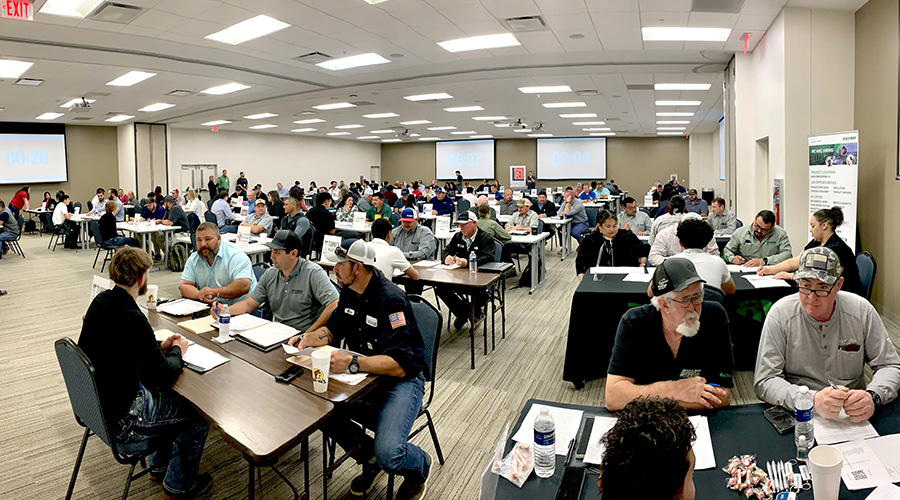Certifications Carry Value for Facility Managers
FacilitiesNet helps narrow down which certification would be the best for future FMs
By Sara Myers-Hogshead, Contributing Writer
Individuals in facility management may wonder about the value of having multiple credentials or certifications by their name. It is easy to contemplate whether it would make a difference or not in their careers. Afterall, it does take time, and in some cases, it costs money to get certified. Those who carry these certifications, though, don’t regret them.
With so many certifications to choose from within the industry, there are some that are better suited than others based on your facility type. FacilitiesNet recently spoke with leaders at each organization to help narrow down which one would be the best for future FMs.
U.S. Green Building Council (USGBC)
Director of client solutions at U.S. Green Building Council, Lisa Stanley says that when an organization claims sustainability, it's integral to have a third party come in and its validity. Obtaining certifications like Leadership in Energy and Environmental Design (LEED) helps individuals further environmental sustainability goals (ESG).
Obtaining these credentials as facility managers is better for businesspeople and the environment because millions of people live and work in LEED-certified buildings worldwide, Stanley says. Individuals obtaining credentials through the company and the LEED certification of the buildings they work in contribute to enhancing the building’s performance.
WELL (International WELL Building Institute)
“Earning the WELL Accredited Professional (WELL AP) credential signifies a personal and professional commitment to promoting human health through building operations and design,” says Jessica Cooper, chief product officer at the International WELL Building Institute.
WELL APs have shown proficiency in the WELL Building Standard (WELL), which includes a collection of evidence-driven design, policies and performance-focused strategies aimed at creating spaces centered on people.
The building occupants often look to facility managers to operate their spaces in a healthy, safe and productive manner. The COVID-19 pandemic greatly influenced these expectations and required facility managers to have a more holistic understanding of how building operations could affect the occupant’s well-being.
IFMA (International Association for Facility Management Professionals)
Chief professional development content officer Cathy Pavick says IFMA looks at a global perspective when developing its credentials.
“We look for practitioners who are working in all different regions in different situations,” Pavick says. “And then what we do is, collectively bring all that together into our surveys. Then when we go out, we translate our surveys, we go out and collect that information.”
She adds that they are looking at developing the credentials from a broad perspective and regional standpoint. IFMA then brings that information to the testing process and looks for the common denominators.
They take the information they find and see what information is relevant to one region or a specific facility, Pavick said.
“So, if you're working today in a hospital, but tomorrow in retail, you can take what you've learned and transport that over and still is very relevant.”
National Fire Protection Association (NFPA)
NFPA does not make the final decision about what is on their certification exams or what the qualifications are to take them, director of certification and accreditation Dan Pickel explains.
“We work with subject matter experts around the globe at this point who volunteer their time, and then we ask them, for this role, what's the knowledge, what are the skills, what are the tasks someone needs to be able to perform to be considered competent?” Pickel says.
Pickel said that the exam is meant to match the role someone is applying for. NFPA has seventeen certifications within the fire and electrical safety space.
“I think from an individual perspective, it's money and marketability when it comes to why companies might want to invest in hiring certified folks,” Pickel says. “It usually comes down to having a qualified workforce. So that puts them in a better position to get bids on jobs if they're using the certifications or saying that their staff are certified.”
Building Owners and Managers Institute (BOMI)
According to its website, BOMI’s certificate program can provide individuals with knowledge that will help them grow and progress in their careers.
BOMI offers five certificate programs, and each program has three years to complete these programs, depending on what certificate they are looking to obtain.
The Property Administrator program is for those who manage building operations or building portfolios. The program can help the manager learn how to maximize their building efficiency and cost-effectiveness, among more.
The Property Management Financial Proficiency certificate is for professionals who analyze, manage, and invest in real estate assets. The program will help individuals analyze financial statements and learn how to properly manage facility budgets and more skills.
The Facilities Management certificate is for people who oversee ongoing operations and maintain facilities. The program will help maximize building efficiency, manage operations, and more.
The last two certificate programs are the Building Systems Maintenance and Building Energy Certificates. More information on these programs can be found on BOMI’s website.
Sara Myers-Hogshead is a freelance writer based in Loves Park, Illinois.
Related Topics:












